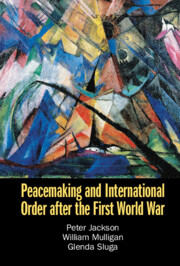Book contents
- Peacemaking and International Order after the First World War
- Peacemaking and International Order after the First World War
- Copyright page
- Contents
- Contributors
- Acknowledgements
- 1 Introduction
- Part I Ordering Concepts
- Part II Institutions
- 7 A ‘New Diplomacy’?
- 8 The League of Nations
- 9 The Treaty of Versailles, German Disarmament and the International Order of the 1920s
- 10 Planning for International Financial Order
- 11 Raw Materials and International Order from the Great War to the Crisis of 1920–21
- Part III Actors and Networks
- Part IV Counterpoint
- Index
11 - Raw Materials and International Order from the Great War to the Crisis of 1920–21
from Part II - Institutions
Published online by Cambridge University Press: 18 May 2023
- Peacemaking and International Order after the First World War
- Peacemaking and International Order after the First World War
- Copyright page
- Contents
- Contributors
- Acknowledgements
- 1 Introduction
- Part I Ordering Concepts
- Part II Institutions
- 7 A ‘New Diplomacy’?
- 8 The League of Nations
- 9 The Treaty of Versailles, German Disarmament and the International Order of the 1920s
- 10 Planning for International Financial Order
- 11 Raw Materials and International Order from the Great War to the Crisis of 1920–21
- Part III Actors and Networks
- Part IV Counterpoint
- Index
Summary
This chapter focuses on problems of raw materials and international order in the aftermath of the First World War. It shows how post-war planning during the war was premised on fears that crippling raw material shortages would weaken the military strength and economic vitality of the European Allied empires long after the conflict came to an end. However, efforts to ensure that wartime Allied measures of economic cooperation continued into the peace were blocked by the US government and industry groups. The chapter then shows how, after the war, a very different problem of raw materials – overproduction and glut – led to new, and more successful, international economic institution-building efforts. This other form of international cooperation, which was supported by powerful industry groups, proved highly durable, and later resulted in powerful institutions like OPEC. Where fears of raw material shortages were successful in spurring on preparations for war, it was the problem of overproduction that underpinned lasting peacetime efforts to reshape the international order and global economic governance
- Type
- Chapter
- Information
- Peacemaking and International Order after the First World War , pp. 266 - 286Publisher: Cambridge University PressPrint publication year: 2023



